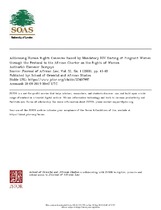| dc.contributor.author | Ebenezer, Durojaye | |
| dc.date.accessioned | 2019-10-04T12:14:10Z | |
| dc.date.available | 2019-10-04T12:14:10Z | |
| dc.date.issued | 2008 | |
| dc.identifier.citation | Durojaye, E. 2008. Addressing Human Rights Concerns Raised by Mandatory HIV Testing of Pregnant Women through the Protocol to the African Charter on the Rights of Women. Journal of African Law. 52(1), 43-65 | en_US |
| dc.identifier.uri | http://hdl.handle.net/10566/4898 | |
| dc.description.abstract | This article considers the importance of preventing mother to child transmission of HIV in Africa. It argues, however, that any approach to achieving this aim must be consistent with respect for human rights. In particular, it argues that mandatory HIV testing of pregnant women violates their rights to autonomy, health and reproductive care, and non-discrimination, all guaranteed in the Protocol to the African Charter on the Rights of Women and other international and regional human rights instruments. It concludes by arguing that respect for women's human rights should form the fulcrum for any call for mandatory or routine HIV testing of pregnant women in Africa. | en_US |
| dc.language.iso | en | en_US |
| dc.publisher | Journal of African Law | en_US |
| dc.subject | Mandatory HIV testing | en_US |
| dc.subject | Protocol to the African Charter on the Rights of Women | en_US |
| dc.subject | Human rights | en_US |
| dc.subject | HIV/AIDS | en_US |
| dc.subject | Health and reproductive care | en_US |
| dc.title | Addressing Human Rights concerns raised by mandatory HIV testing of pregnant women through the Protocol to the African Charter on the Rights of Women | en_US |
| dc.type | Article | en_US |

